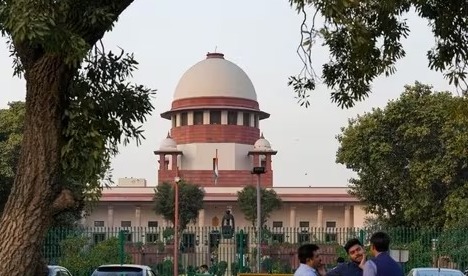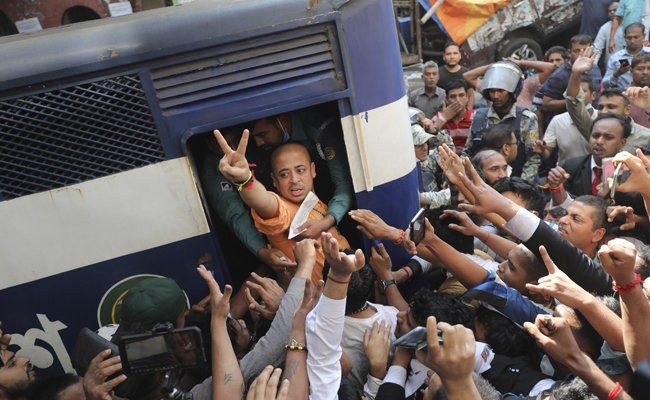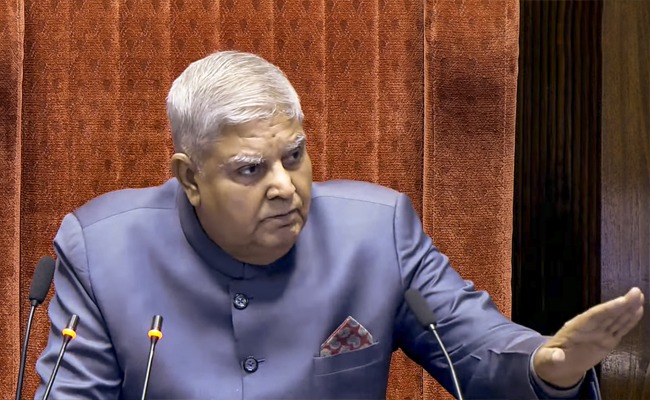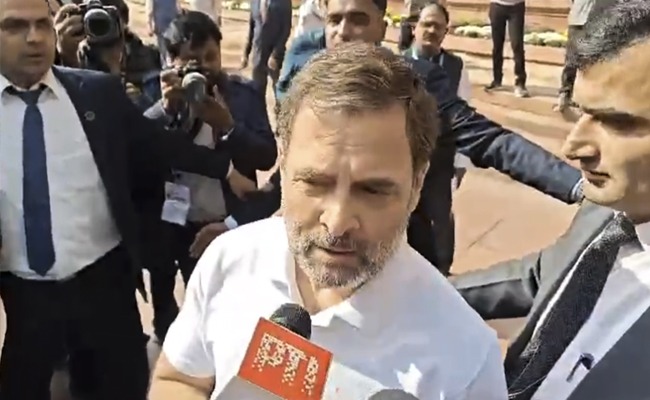New Delhi(PTI): Climate activist Sonam Wangchuk and several others from Ladakh paid tributes to Mahatma Gandhi at his memorial Rajghat on Wednesday evening and later said they have been released from police detention and ended their fast.
The group gave a memorandum to the government listing their demands, and have been assured of a meeting with top leadership soon, Wangchuk said, adding they have ended their fast.
"We have given a memorandum to the government to protect Ladakh under such constitutional provisions so that its ecology can be preserved, in this case it is the Sixth Schedule, which gives locals the right to govern and manage the resources," Wangchuk told media after visiting Mahatma Gandhi's memorial.
"Locals should be empowered in the Himalayas because they can best preserve it," he said.
"In the coming days, we will meet the prime minister, president or home minister, this is the assurance we have been given by the home ministry," he said.
"We have demanded a democratic set-up for Ladakh, and the Sixth Schedule is also a part of it. We have been assured that we will meet top leadership, and the date of meeting will be confirmed in a couple of days," Wangchuk said.
A senior police officer confirmed that Wangchuk and all other 'padayatris' were released in the evening.
"They were allowed to go after an assurance from them of not gathering or holding any yatra as Section 163 is imposed in central parts of the national capital," the officer said.
Wangchuk was kept at the Bawana police station while other 'padayatris' were at three other police stations at Delhi-Haryana border.
All were escorted in buses by police personnel till Rajghat at about 9.30 pm and later, Wangchuk and all others 'padayatris' were allowed to go.
Police sources said Wangchuk might stay in Delhi for a few more days to seek meeting with the government.
Wangchuk said they have been assured that talks with the representatives of the Leh Apex Body and Kargil Democratic Alliance will resume within 15 days.
Wangchuk was leading the 'Delhi Chalo Padyatra', which began from Leh a month ago. Around 170 people from Ladakh, who were marching to Delhi demanding safeguards under the Sixth Schedule of the Constitution for the Union Territory among other things, were detained on Monday night at Delhi's Singhu border, and were taken to different police stations where they went on a hunger strike.
The march was organised by the Leh Apex Body (LAB), which along with the Kargil Democratic Alliance (KDA), has been spearheading an agitation for the past four years to demand statehood for Ladakh, seek its inclusion under the Sixth Schedule of the Constitution, early recruitment process along with a public service commission for Ladakh and separate Lok Sabha seats for Leh and Kargil districts.
Delhi Police had detained them citing the imposition of section 163 (which was earlier section 144 of CrPC) of Bharatiya Nagarik Suraksha Sanhita in the districts of New Delhi, North and Central and all police stations jurisdiction sharing the borders with other states.
Let the Truth be known. If you read VB and like VB, please be a VB Supporter and Help us deliver the Truth to one and all.
New Delhi (PTI): In a significant verdict, the Supreme Court has said religious conversions undertaken solely to avail reservation benefits without genuine belief amounted to a "fraud on the Constitution".
Justices Pankaj Mithal and R Mahadevan passed the verdict on November 26 in a case filed by one C Selvarani and upheld a Madras High Court decision of January 24 denying a scheduled caste certificate to a woman who converted to Christianity but later claimed to be a Hindu to secure employment benefits.
Justice Mahadevan, who wrote the 21-page verdict for the bench, further underscored that one converted to a different religion, when they were genuinely inspired by its principles, tenets and spiritual thoughts.
"However, if the purpose of conversion is largely to derive the benefits of reservation but not with any actual belief in the other religion, the same cannot be permitted, as the extension of benefits of reservation to people with such ulterior motives will only defeat the social ethos of the policy of reservation,” he noted.
The evidence presented before the bench was found to have clearly demonstrated that the appellant professed Christianity and actively practiced the faith by attending church regularly.
"Despite the same, she claims to be a Hindu and seeks for a SC community certificate for the purpose of employment," it noted.
"Such a dual claim made by her," said the bench "was untenable and she cannot continue to identify herself as a Hindu after baptism".
The top court, therefore, held the conferment of scheduled caste communal status to the woman, who was a Christian by faith, but claimed to be still embracing Hinduism only for the purpose of availing reservation in employment, "would go against the very object of reservation and would amount to fraud on the Constitution".
The top court underlined a religious conversion solely to access reservation benefits, without genuine belief in the adopted religion, undermined the fundamental social objectives of the quota policy and her actions were contrary to the spirit of reservation policies aimed at uplifting the marginalised communities.
Selvarani, born to a Hindu father and a Christian mother, was baptised as a Christian shortly after birth but later claimed to be a Hindu and sought an SC certificate to apply for an upper division clerk position in Puducherry in 2015.
While her father belonged to the Valluvan caste, categorised under scheduled castes, he had converted to Christianity, as confirmed by documentary evidence.
The verdict said the appellant continued to practice Christianity, as seen by the regular church attendance, making her claim of being a Hindu untenable.
The bench noted individuals converting to Christianity lose their caste identity and must provide compelling evidence of reconversion and acceptance by their original caste to claim SC benefits.
The judgement said there was no substantial evidence of the appellant's reconversion to Hinduism or acceptance by the Valluvan caste.
Her claims lacked public declarations, ceremonies, or credible documentation to substantiate her assertions, it pointed out.
"One converts to a different religion when genuinely inspired by its principles. Conversion purely for reservation benefits, devoid of belief, is impermissible," the bench held.
The apex court opined in any case, upon conversion to Christianity, one lost their caste and couldn't be identified by it.
"As the factum of reconversion is disputed, there must be more than a mere claim. The conversion had not happened by any ceremony or through 'Arya Samaj'. No public declaration was effected. There is nothing on record to show that she or her family has reconverted to Hinduism and on the contrary, there is a factual finding that the appellant still professes Christianity,” it noted.
The bench said there was evidence against the appellant, and therefore, her contention raised that the caste would be under eclipse upon conversion and resumption of the caste upon reconversion, was "unsustainable".

_vb_72.jpeg)



